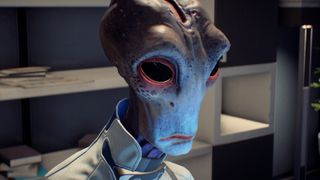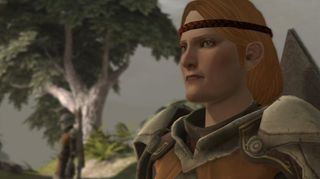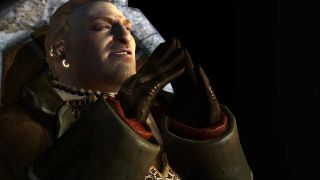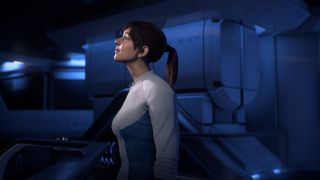Mass Effect: Andromeda could have been brilliant - if it was more like Dragon Age 2

Mass Effect: Andromeda would be better if BioWare had taken more cues from Dragon Age 2. I know this reads like tedious contrarianism - “That thing you hate is actually great!” - but much like BioWare’s least popular game, my argument will improve if you give it time. Hopefully.
First off: Mass Effect: Andromeda is good. It’s a compliment to BioWare that a game we scored 3.5/5 is somehow considered a disappointment. But it’s also frustrating, because Andromeda fails in areas traditionally considered BioWare specialities. We’ll ignore the bizarre animation for now - it’s preposterous to condemn a 60-hour adventure because of some digital gurning - and focus instead on the things Dragon Age 2 gets right that Andromeda doesn’t: setting, story, and character.

Now, before you stop reading, let’s be honest with each other. When I first played it, Dragon Age 2 struck me as the very definition of a 7/10 game. The recycled dungeons make you feel you’re in a David Lynch adaptation of The Hobbit. It’s uglier than an orthopaedic sandal. It’s vigorously, relentlessly brown. Combat exists in a curious limbo between Origins and Inquisition, unwilling to drop the turn based stuff, but never reactive enough to feel like a real action game. You just tap attack until you get carpal tunnel syndrome and watch Hawke get gradually more messy. The result is a game which, for the first eight hours, feels like turning a mysterious crank in a mineshaft. You know what you’re doing is important, but you don’t know exactly why.
But here’s the thing: let Dragon Age 2 into your heart, and it’s wonderful. Perhaps the best Dragon Age game, and certainly one of BioWare’s finest settings. It’s a triumph of well-crafted characters, and proof that if the people you’re with are interesting enough, the banality of your surroundings barely matters. DA2 could be a text adventure and it would still be compelling.

It helps that it begins with a fantastic bit of storytelling. A cutscene shows a roguish dwarf, Varric, being interrogated by the imperious Cassandra Pentaghast. It immediately emphasises the player’s significance. You’re important enough for two strangers to discuss, one desperate to find you, the other lying to protect you. By framing it in such a human way - sorry, Varric - you get a relatable sense of your own importance. By contrast, the pre-release fluff for Andromeda emphasises your role as the Pathfinder, building you up as last hope for intergalactic colonisation, but the opening of the game fails to deliver on that promise. It’s a tangle of tutorials and unrelatable loss, made more confusing by the fact you’re a family. Your sibling suffers a fault with their cryogenic pod, but at this point as a player, you’ve never even met them. The fact it’s so difficult to care what happens takes you out of the moment, reminding you you’re playing a game. Picking the dialogue option for ‘worried’ feels like fake sympathy at a funeral. And worse still, your father is in charge, which narrows the scale further, making the story a small, sad cocktail of nepotism and daddy-issues when it should feel like a grand adventure beyond the stars.
Both games deal with the concept of fleeing one place and finding a new home in another, but somehow, Kirkwall represents the more imposing new life. Perhaps DA2’s message works better because it’s streamlined. You’re fleeing with your family, working with desperate strangers to escape certain death. By the time you reach Kirkwall, you’ve already experienced conflict and loss, and it’s as harsh and alien a place as you could imagine. If BioWare can make a city full of humans so unwelcoming, why does a galaxy full of new aliens feel so familiar? Andromeda seems like the end of a long haul flight by comparison. Worse still is the squandered opportunity to see how Andromeda’s hand-picked negotiators tackle first contact with an alien race. The short version? Shoot the everliving shit out of them. What could have been Andromeda’s most fascinating moment is reduced to a head-popping combat tutorial, nuance replaced with savagery. If nothing else, at least we know why humans caused the First Contact War. Perhaps meeting the Angara first would have added the context Andromeda needed; or perhaps Ryder would have just shot them, too. Even DA2’s loading screen, with its weeping statues and lingering threat of slavery, does a better job of establishing the place you’re in.

And then there’s the characters. I certainly don’t dislike any of the squadmates in Andromeda - Liam in particular is the sort of guy I’d be happy stuck talking to in a pub - but I don’t love them, either. DA2 has characters who are worth getting to know. You talk to them because they’re interesting, not because you’re chasing the closure of a clumsy sex scene. Aveline is a useful example, and she personifies everything great about BioWare’s writing. She’s atypically designed, especially for a female character, and has enough depth that you could be an NPC in her story. Whatever kind of Hawke you play, you discover more about yourself by interacting with her, and the fact that she’s not romanceable heightens this. Few of us get to pick partners from a menu of willing paramours, and quietly discovering you care for someone as a friend is a more humane, engaging experience than banging the first handsome NPC who promises to prod your loins. What more could you want from a role playing game than it to elicit the same responses you feel in real life?
Sign up to the GamesRadar+ Newsletter
Weekly digests, tales from the communities you love, and more
Finally, there’s the most obvious common ground of all: every Dragon Age game is a reboot. The events take place in the same world, but there’s as much narrative distance between Origins and DA2 as there is between Mass Effect 3 and Andromeda. Andromeda’s problems can’t be excused because it’s a reboot, or because it takes place in a different location; BioWare has done it before and nailed it. In truth, the similarities to previous games are exactly what make Andromeda feel pedestrian. Dragon Age 2 proves that small tweaks make a big difference, and with the correct cast of characters, you needn’t threaten the lives of thousands to engage people. Make the player care enough about nine people, and the rest will follow.
Take a look at this Dragon Age 2 romance guide if you want to know which characters can and can't be romanced.
Most Popular



